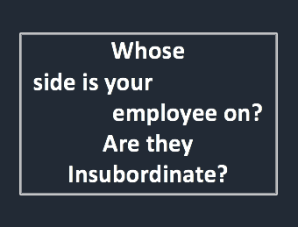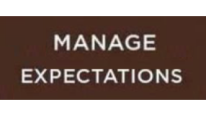December 13, 2018
by Bruce Mayhew
It’s a busy time of year.
Yesterday you had an employee unexpectedly take a sick day because their child was ill. This situation is inconvenient, but managing situations like this is part of what being a leader is about. Shake it off.
Today this employee comes in at 9:30AM, about 1-hour later than their usual start time. Argh… frustrating. And now, as it pushes 10AM they still have not settled down – meanwhile you and other members of your team are running around trying to meet a few important deadlines. Not only is this even more frustrating, you are also feeling more and more angry which is slowly moving into resentment and disappointed targeted squarely at this employee – and echoed by many of their coworkers. Yikes! Time to catch yourself and be careful.

I’m sorry to say but instances like this is where it will show off your leadership skills.
What you can do?
As a leader I believe you have to hold this employee accountable. This means you will not hesitate (for long), before you have a difficult conversation with her about her actions (or lack of), this morning.
Now, let me be clear. Having a ‘difficult conversation’ isn’t about pinning blame or doing your best to make someone feel inferior or bad. This is about managing each others expectations. Also, difficult conversations are not yelling matches. If you holler and scream you are just doing damage to your personal and professional reputation.
Difficult conversations are ‘difficult’ because they are usually uncomfortable. But what they do accomplish is clearing the air. These conversations give you an opportunity to discuss what is important… to each of you… in a respectful, honest way. In the example above, what is important is to let the employee know her actions today (not yesterday), are letting you and the rest of the team down; no blame – just reality. On a side note, I’d suggest it would be very cool and respectful of you to not mention her 9:30AM start because her morning might have had some lingering challenges from her child being ill.
This is about managing expectations.
The reality is that if you don’t have have that difficult, uncomfortable conversation – if you do nothing about her behaviour today you should not expect anything to change – and you are setting an example for the rest of the team; and you don’t want that. At the same time, if you don’t invest in that difficult conversation you will be losing the opportunity to learn more about what may be bothering this employee and how you might be able to help her today and in the future.
Step 1 of being a great Leader
You have to talk about what is going on. As a leader you have to manage her expectations and tell her what you need… even if she really should know what those expectations are. To make this work better in the future you may want set up a new best-practice that whenever someone is out due to illness that first thing they have a 10-minute meeting with you to check-in and to re-set their schedule.
Step 2 of being a leader
You still have to inspire and motivate her, even if she is disappointing you. So, try to have everything you do and say to have a positive twist. You will see this explained further in the examples below.
Your mindset should lean to letting her know that her contribution is important!
Step 3a of being a leader
Prepare a great first sentence. This is important. Seriously, it’s really important.
What you SHOULD NOT say. “You are disappointing me – after taking a questionable day off you are now wandering around here disturbing others and being a nuisance – perhaps it would have been better you take another day off and call it a vacation day.”
What you COULD say. “Bonnie, I’m glad you are back and I hope your child is feeling better. I really need you to get onto PROJECT A and have it done by 11:30 this morning. Can you do that? The team worked on XYZ yesterday but your experience and expertise will help us finish it. After that, let’s talk about two other priorities we need you to be part of. Please come see me at 11:30AM for a recap and status of PROJECT A.”
Sure the second approach is a bit more hand-holding and perhaps you don’t think you should have to… if only they were more like you. But as a leader it’s your responsibility to get the best out of the people you have and for now it seems clear you have to do a bit of hand-holding. Perhaps with this hand-holding they will begin to learn. I’ll assure you – some will, and some will not.
As a leader soft skills can be as much as 80% of your responsibilities. It is not your job to work work work… it’s your job to inspire, motivate, empower and to build a trusting culture within a strategic vision… all while living the company values and producing quality, competitive results.
Step 3b of being a leader
Bonnie is not settling down.
If she continues to not settle down, keep sharing how you are feeling, but be careful to still not be emotional. Keep your empathy turned on – but stay firm with your work responsibilities and dedication to supporting your ream when they need your support.
For example you might want to say something like, “Bonnie, I’m getting a bit frustrated that we have all the work I shared with you this morning that needs to get done and you are not settling down to help the team. Is there something you need or is there something going on that I need to know about?”
Talking about how you are feeling is part of being truthful. You are not pushing blame and it certainly doesn’t make you look weak. Again, it’s about managing expectations and trying not to assume why someone is… or is not doing something. Discussing feelings helps give everyone a clear picture of the impact of our actions – or inactions.
Conclusion
There is never any one perfect solution I can give you, but what I’ve shared above does work – I promise. Stay focused on your needs and your personal and professional values. They will help keep you grounded.
Great leaders have to keep adapting to new environments and more complicated situations faster than ever before. Among everything else, even employee needs are becoming more challenging and often more personal.
This is where being more connected to our feelings and tapping into our empathy and compassion is the right solution. Learn how to work with your soft skills. Even in difficult times, great leaders still try to instil trust, compassion, support, teamwork and hope.
You may have to get outside your comfort zone… but you can do it.
We hope you enjoyed this post.
Bruce Mayhew Consulting facilitates courses including Generational Differences, Business Writing, Email Etiquette, Time Management and Mindfulness.

Click on the image to watch us on Canada AM.
Find answers to your Professional Development questions / needs at brucemayhewconsulting.com.
Call us at 416.617.0462.


I’d enjoy reading your comments on this post.



